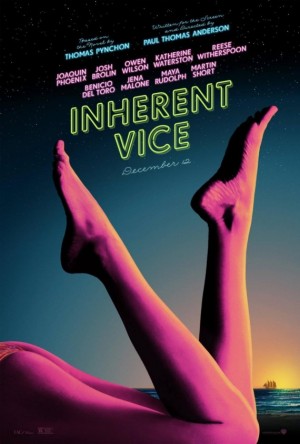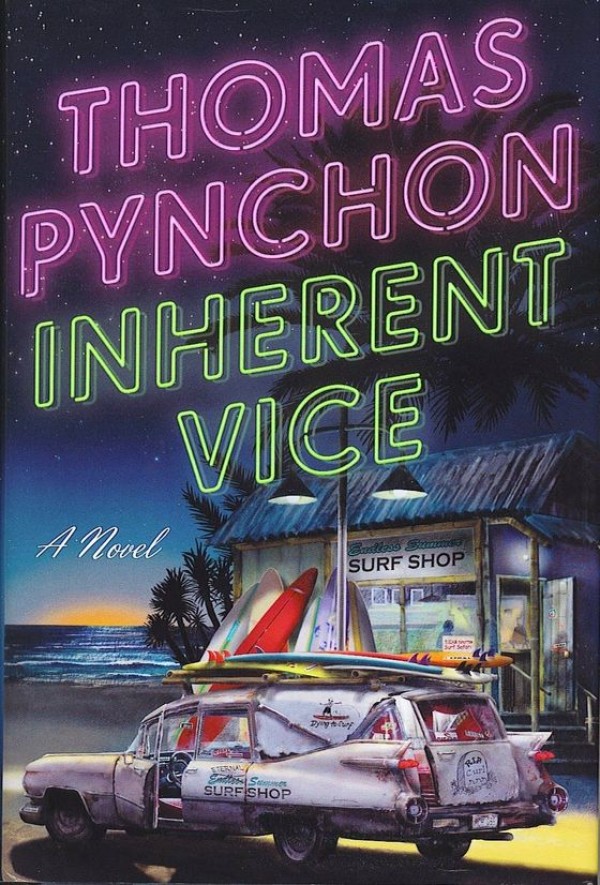WALL STREET JOURNAL: One film, two masters. That’s the easiest, most direct way to describe the power behind “Inherent Vice,” the much-anticipated stoner noir film that had its world premiere Saturday night as the centerpiece of the New York Film Festival at Lincoln Center. The film is loaded with all sorts of familiar Hollywood faces, but the biggest stars of the project are its director and screenwriter, celebrated auteur Paul Thomas Anderson, and the author whose novel served as source material, great American novelist Thomas Pynchon. The two were the buzz of the red carpet Saturday night, even as the likes of stars Joaquin Phoenix, Josh Brolin and Owen Wilson made their way to the gala presentation of the film. “I read the novel first, and then I read the script, and Paul was very — he feels that you just channel the novel,” said Martin Short, who plays deranged, lecherous, drug-addled dentist Rudy Blatnoyd. “I just love the insane, specific feel of it. I was 21 in 1971, so I knew the era, and I thought it captured its insanity perfectly.” MORE
TIME: Set in the fictional Gordito Beach (standing in for Manhattan Beach, the raffish Los Angeles suburb where Pynchon lived in the early ’70s), IV offers a time capsule of attitudes from that precise moment when the Flower Power of hippie culture wilted under the anarchic forces of Vietnam turmoil, the incendiary rhetoric of the Black Panthers and the psycho-killer exploits of the Charles Manson gang. (In a weird fluke, this weekend’s horror movie Annabelle also dips into Manson Family values.) And don’t forget Nixon. It’s a time and town where paranoia is just common sense. As one cop tells Doc, “Any gathering of three or more civilians is considered a possible cult.”
Pynchon threw all those elements into a private-eye pastiche that takes its cue from Raymond Chandler’s Philip Marlowe, the cynical knight on a ’40s crusade to cleanse the mean streets of Los Angeles. Like Marlowe, Doc (Joaquin Phoenix) wanders  through all levels of L.A. society, from high Hollywood to beach bum, from angry cops to shyster lawyers and plutocrats with secrets. And like Chandler, who confessed that he couldn’t explain one of the deaths (the chauffeur’s) in The Big Sleep, Pynchon doesn’t bother tying up his plot’s loose ends. He wants audiences not to worry about the destination, just to enjoy the ride. For cultural touchstones, consult a Netflix roundup of ’70s post-noir crime movies. IV has inhaled portions of Klute (the nexus of prostitution and big business), Chinatown (property swindles that key the growth of Los Angeles), Night Moves (a sleuth flummoxed by missing daughters and multiple deaths) and especially The Long Goodbye, Robert Altman’s deconstruction of the Chandler novel — and of any hero who tried to make sense of a world spinning into incoherence. MORE
through all levels of L.A. society, from high Hollywood to beach bum, from angry cops to shyster lawyers and plutocrats with secrets. And like Chandler, who confessed that he couldn’t explain one of the deaths (the chauffeur’s) in The Big Sleep, Pynchon doesn’t bother tying up his plot’s loose ends. He wants audiences not to worry about the destination, just to enjoy the ride. For cultural touchstones, consult a Netflix roundup of ’70s post-noir crime movies. IV has inhaled portions of Klute (the nexus of prostitution and big business), Chinatown (property swindles that key the growth of Los Angeles), Night Moves (a sleuth flummoxed by missing daughters and multiple deaths) and especially The Long Goodbye, Robert Altman’s deconstruction of the Chandler novel — and of any hero who tried to make sense of a world spinning into incoherence. MORE
METRO: There are many obvious films that flash in the brain while watching “Inherent Vice.” It’s “The Big Sleep,” another film where the impenetrability of the plot in no way lessens the entertainment of each and every scene. It’s “The Big Lebowski,” with a perpetually toking lead — here, Joaquin Phoenix’s wild-haired, mutton chopped Larry “Doc” Sportello. Being a film by Paul Thomas Anderson, it boasts bits of his onetime employer, Robert Altman, including “The Long Goodbye,” which dumped a mumbly Philip Marlowe into pot-hazed and boob-sprinkled 1973. The humor, though, is closer to “Brewster McCloud”: zany, wacky, almost alienatingly eccentric.
“Inherent Vice” is all of these films and more. And yet — like Anderson’s “The Master,” as well as “Punch-Drunk Love” — there’s nothing remotely like it. Actually, there is: It’s a lot like “Inherent Vice,” the Thomas Pynchon novel on which it’s based. It’s a faithful adaptation, or as faithful as one can be in 148 minutes; to write the screenplay, Anderson first transcribed the entire thing verbatim into script form, then hacked it down from phone book-size. He chucks key scenes, whittles down certain characters into one-off cameos and loses some of the better jokes. (Also gone are the songs Pynchon namechecks, though gaining Can and a Jonny Greenwood score is nothing to sneeze at.) But it plays like Pynchon: a highly digressive, absurdist alternate reality that delights in confusing anyone trying to “solve” it as pure, cold narrative. It’s just Pynchon filtered through another, almost equally oddball voice. MORE
DAILY BEAST: In 1969, Southern California was enveloped by a gloomy, suffocating haze when Charles Manson and his followers committed a series of brutal murders in Benedict Canyon. The events left an unending chill over Los Angeles; the innocence of the ‘60s had officially been snuffed out. If Manson and his lunatic fringe represented a shockingly abrupt finale of peace and love, then Inherent Vice might be considered its death rattle—a universe looking to hold onto the last strands of an era that has long since passed. MORE
PAUL THOMAS ANDERSON’S INHERENT VICE OPENS DECEMBER 12th

